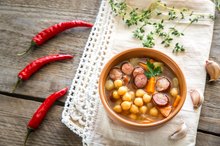What does fact checked mean?
At Healthfully, we strive to deliver objective content that is accurate and up-to-date. Our team periodically reviews articles in order to ensure content quality. The sources cited below consist of evidence from peer-reviewed journals, prominent medical organizations, academic associations, and government data.
- Cleveland Clinic: Understanding Coumadin
- MayoClinic.com; Grape Juice: Same Heart Benefits as Wine?; July 2009
- MedlinePlus: Cranberry
The information contained on this site is for informational purposes only, and should not be used as a substitute for the advice of a professional health care provider. Please check with the appropriate physician regarding health questions and concerns. Although we strive to deliver accurate and up-to-date information, no guarantee to that effect is made.
Is Grape Juice OK to Drink While Taking Coumadin?
Also sold under the generic name of warfarin, Coumadin is an anticoagulant medication taken to prevent the formation of blood clots 1. As Coumadin thins the blood and reduces its blood-clotting capabilities, it often serves as an effective preventer of heart attacks and strokes 1. Although the drug manufacturer does not specifically recommend avoiding grape juice while taking Coumadin, there are specific safety considerations to keep in mind 1.
Coumadin
Rather than exerting an effect directly on the blood, Coumadin works on the liver 1. Among its many other functions, the liver produces clotting factors. When these clotting factors combine with vitamin K, they help the blood cells clump together and form blood clots. When Coumadin is taken, it prevents the liver from producing clotting factors 1. As these clotting factors become depleted from the blood supply, the blood gets thinner and is no longer able to form clots.
Coumadin and Juice
Drugs to Avoid When Taking Warfarin
Learn More
While taking Coumadin, the drug manufacturer recommends that you should avoid drinking cranberry juice 1. According to MedlinePlus, cranberry juice could potentially increase the amount of time Coumadin stays in the body 1. If Coumadin remains in the body for too long and the blood gets too thin, the risk of bleeding or hemorrhaging increases significantly 1. Although the drug manufacturer does not specifically recommend avoiding grape juice while taking Coumadin, you might consult your physician before making a decision 1. According to MayoClinic.com, the resveratrol antioxidant in grape juice can cause your blood vessels to relax and further prevent the formation of blood clots.
What Else to Avoid
Along with cranberry juice – and potentially grape juice – you should also avoid eating a diet high in vitamin K while taking Coumadin 1. Since vitamin K helps with the formation of blood clots, it can make the Coumadin less effective 1. Foods high in vitamin K include dark green leafy vegetables, vegetable oils, liver and legumes. Consult your physician before taking any additional medications while on Coumadin therapy 1. Certain medications – such as aspirin, acetaminophen, ibuprofen and naproxen, among many others – could increase your risk of bleeding when combined with Coumadin 1.
Safety Tips
Does Vitamin C Affect Coumadin?
Learn More
Coumadin treatment is contraindicated in pregnant women or patients with a bleeding disorder, blood cell disorder, infection of the heart or upcoming surgery 1. Since Coumadin thins the blood, it might also be dangerous among patients with a history of bleeding problems, advanced heart disease, high blood pressure, kidney disease or cancer 1. While taking Coumadin, follow the exact directions provided by your physician 1. Typically, it should be taken at the same time every day. If you miss a dose, consult your physician as soon as possible for further instruction. To ensure safety, never take more than one dose at a time.
- Coumadin treatment is contraindicated in pregnant women or patients with a bleeding disorder, blood cell disorder, infection of the heart or upcoming surgery 1.
- If you miss a dose, consult your physician as soon as possible for further instruction.
Related Articles
References
Writer Bio
Krista Sheehan is a registered nurse and professional writer. She works in a neonatal intensive care unit (NICU) and her previous nursing experience includes geriatrics, pulmonary disorders and home health care. Her professional writing works focus mainly on the subjects of physical health, fitness, nutrition and positive lifestyle changes.








